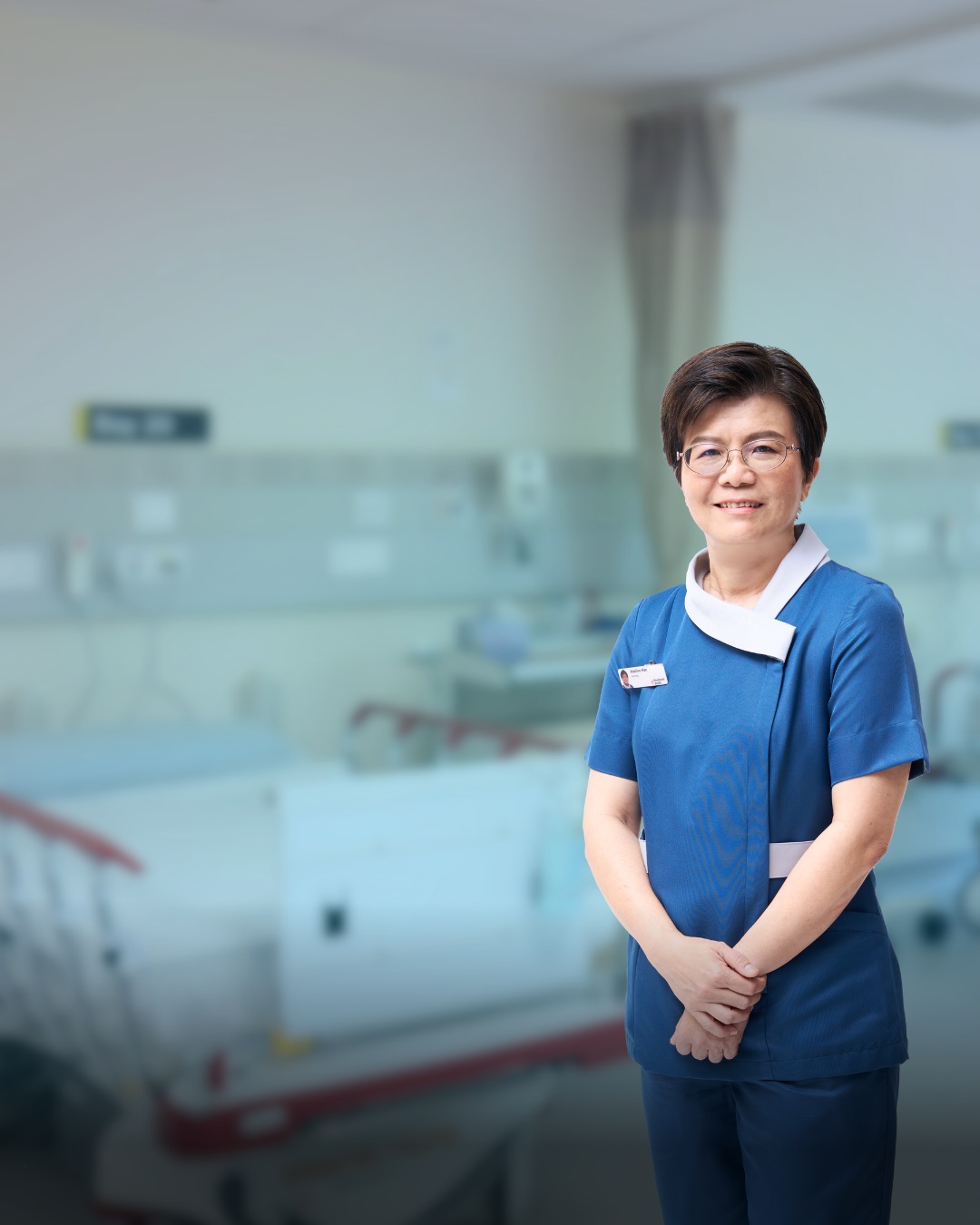"Many people think nursing is about following doctors’ orders or administering medication. In reality, we’re trained to make critical decisions, assess risks, and provide holistic care. We’re continuously thinking, planning, and acting — often simultaneously."
- Adeline Han, Nurse Clinician at Woodlands Health

Please tell us more about your current role at Woodlands Health.
I currently work at the Urgent Care Centre and Emergency Department at Woodlands Health, where I support both patients and staff. My responsibilities include providing clinical care, mentoring junior nurses, handling administrative tasks, and ensuring patients receive the best care and support throughout their recovery.
How long have you been a nurse, and can you give us a brief overview of your career?
I’ve been a nurse for 33 years. Over the decades, I have worked in various departments, adapting to the evolving landscape of healthcare. I’ve seen nursing evolve, and I’ve grown with it — taking on new challenges, mentoring colleagues, and remaining committed to the heart of nursing: caring for people.
What role do you think nurses play in shaping healthcare, beyond patient care?
Nurses are the bridge between patients and the healthcare system. We advocate for patients, streamline workflows, support families, mentor peers, and help implement changes that improve patient outcomes, both in hospital care and in the community.
Can you share a specific challenge in your role that required you to think critically or problem-solve, and how you approached it?
There was a time when a patient suddenly deteriorated, and the attending doctor was delayed. I had to assess, prioritise care, and coordinate with the team quickly, while keeping the family calm. It was a high-pressure situation, but teamwork and clear thinking helped stabilise the patient. This experience reinforced the importance of staying composed and trusting my training during critical times.
In your opinion, what is one thing that the public doesn't fully understand about the nursing profession?
Many people think nursing is just about following doctors’ orders or administering medication. In reality, we’re trained to make critical decisions, assess risks, and provide holistic care. We’re continuously thinking, planning, and acting — often simultaneously.
Nursing can be emotionally demanding. How do you cope with the emotional challenges of the profession, and what helps keep you motivated during difficult times?
Humour helps! A little laughter goes a long way in tough moments. Seeing a patient recover, or even just smile, gives me the strength to keep going. I also lean on my colleagues — we support each other like family.
What moment in your nursing career made you realise you were exactly where you were meant to be?
I had a patient in the ICU who had no relatives. I spent extra time with her, even during my breaks, just to offer comfort and support. The day she was transferred out of ICU, she told me, "Thank you for treating me like a person, not just a patient." That moment reaffirmed why I chose this path.
Looking at your career, how has your personal life influenced your nursing practice, and vice versa?
My upbringing taught me resilience and compassion — qualities that I bring into every shift. Nursing, in turn, has made me more patient and empathetic at home, allowing me to appreciate life more deeply by witnessing both its fragility and strength on a daily basis.
Can you share an instance when you went above and beyond for a patient or a colleague, and what that experience taught you?
There was an elderly patient who came in alone for an ankle fracture. After treatment and the application of a cast, she was ready for discharge, but she had no one to accompany her home. She mentioned that her elderly spouse was housebound and could not come to fetch her. Although her niece would be able to visit her later in the evening, she was anxious about going home alone.
Seeing her nervousness, I offered to accompany her home. We took a cab to her residence, and I helped her to her unit, ensuring she was safe and comfortable. I also reinforced the aftercare advice for her cast and safety precautions. She was extremely grateful and shared that she had been worried about how she would manage the journey home on her own.
This experience taught me the value of paying attention to a patient's emotional and social needs, not just their physical care. It reinforced the importance of being intuitive and compassionate in nursing, and that sometimes, small acts of kindness can make a big difference in a patient’s recovery.
What advice would you give to someone just starting out in nursing, knowing what you do now?
Be open to learning, ask questions, and don’t be afraid to feel overwhelmed at first. Stay kind, stay curious, and always remember why you began this journey.
Do you define this 24/7 shift job as demanding?
Yes, it’s demanding, but also incredibly rewarding. Balancing long shifts, night duties, and personal time can be challenging, but the gratitude from patients and witnessing their recovery makes it all worthwhile.
Was nursing your dream job? What made you choose nursing eventually?
Initially, I wasn’t sure, but once I started nursing and experienced the profound impact nurses have on patients, I knew this was where I belonged. Over time, nursing became my dream and my passion.
